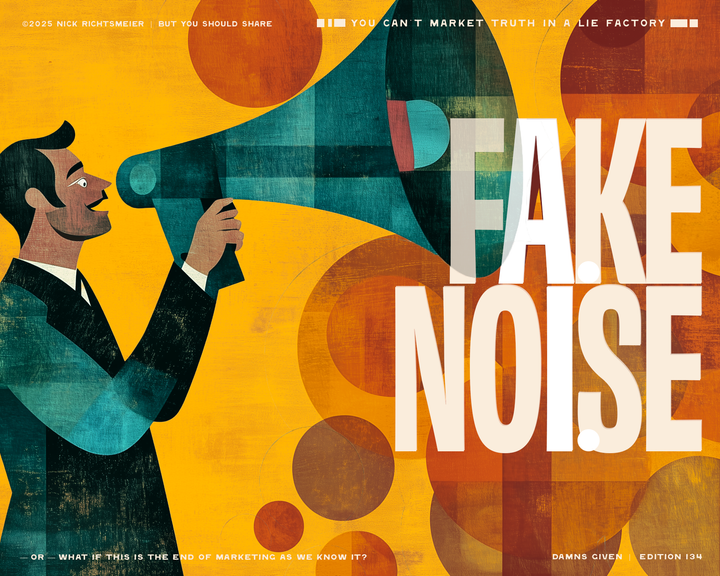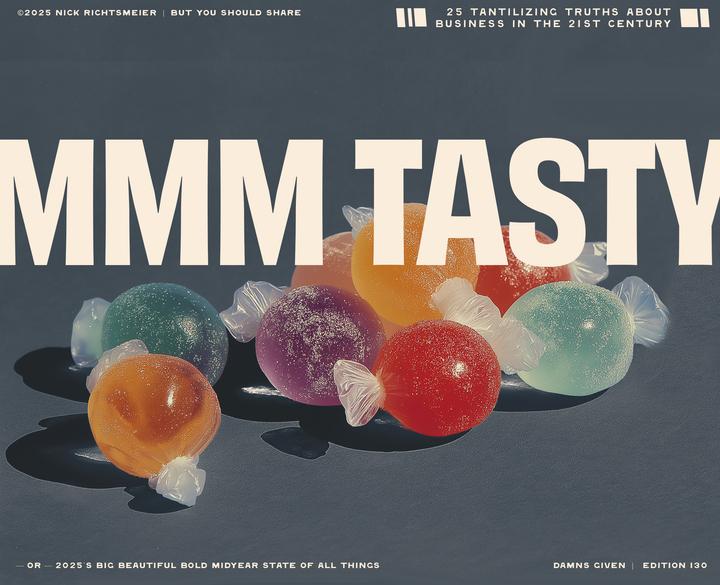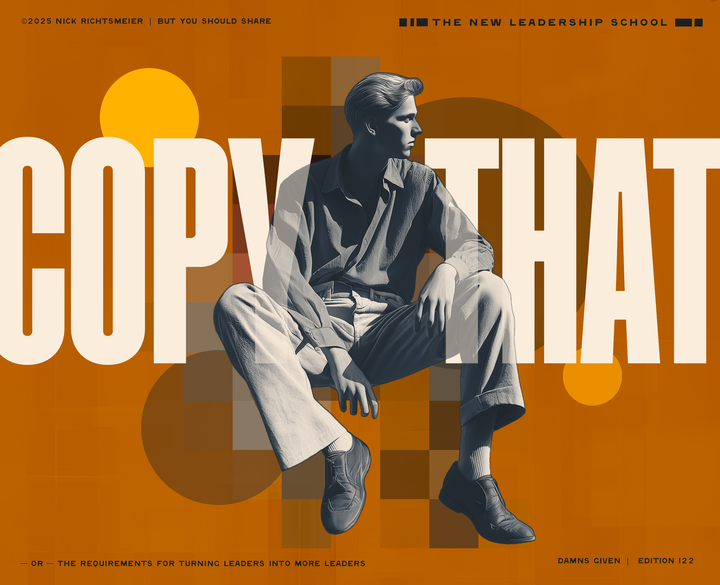Chaos is a ladder.
In this week's FWD, we look at "Who benefits from the chaos?" We live in a time when chaos is a primary tool in driving ventures forward. How do you benefit when the swirling chips of the game are constantly leveraged against ventures like yours?
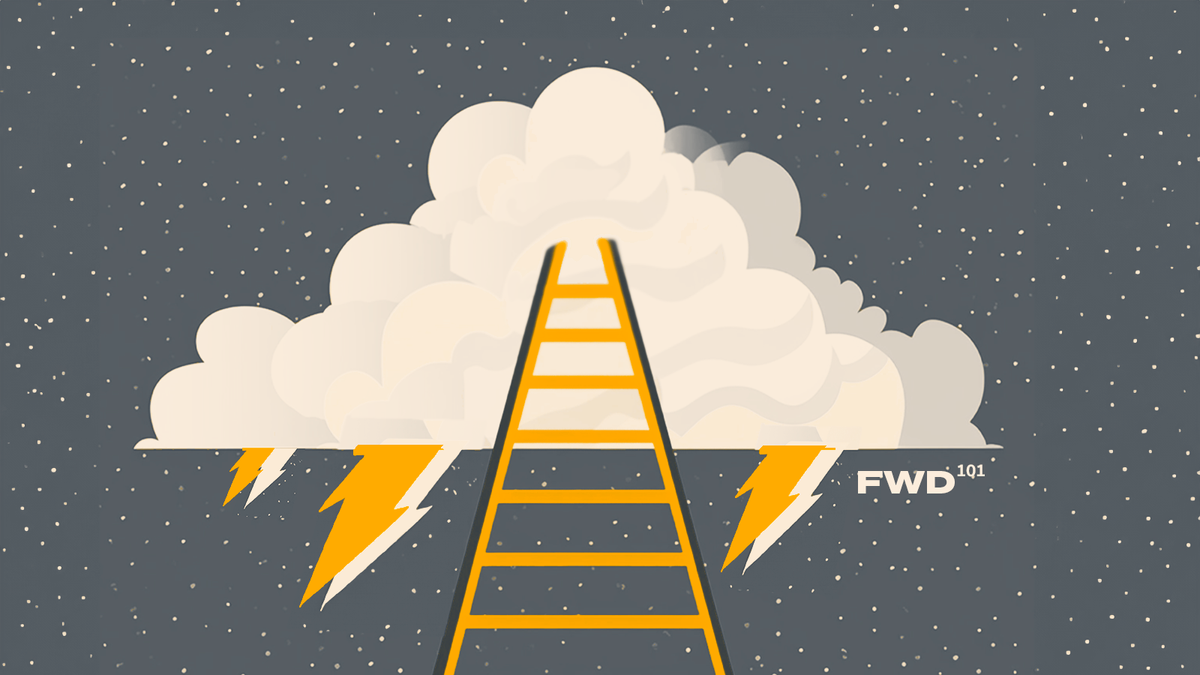
FWD Edition 101
Every marketing decision is an identity decision. Your values and vision are made real by that blog post. That SEO spend. That press release. They all look like little tactics, but they are your cry to the world:
Please notice us for this.
In business and often in life, we are what we hope to be seen for. Our businesses are best recognized by their cries for attention.
It's why so many businesses put so little intention into marketing. It's why they relegate it to Games of Clicks where the stakes are so very low. These businesses want to be seen, they want to be bought, they want to—in their most honest moments—be loved. But "wanting love" is a fragility too dangerous to be revealed.
Hiding is easier. Lack of clarity is easier. The wild swirl of mixed messages and short-term thinking is a chaos engine that allows a leader to say, "See, we tried the thing and it didn't work. Now we can go back to normal." Chaos is the shield for the vulnerability of wanting to be something great. As the great Littlefinger once said, "Chaos is a ladder."
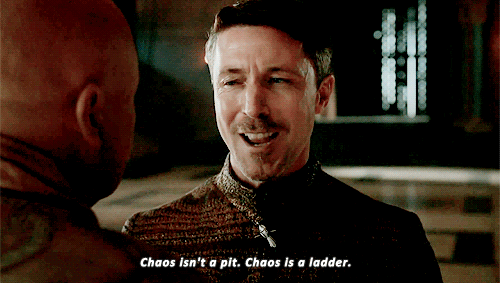
So, your business's growth engine bolts from "digital" to "M&A" to "referrals" to "new services." The narcotic of movement feels so real, so much more stable than the risk of "This is who we are."
Marketing is designed to fail at most organizations because its pre-prequisite class—courageous self-awareness—has not been passed. Marketing is the creative arts tuned to the harmonics of capitalism. And the creative arts are always about revealing risk.
The risk of expression.
The risk of connection.
The risk of commitment to a story of which we cannot know the end game.
As you feel the pulse of chaos in your business, the vertigo of pivot from one thing to the next, ask yourself: who does the chaos benefit? What does this cloud of movement serve?
Indecision happens not because leaders don't know what to do, but because deciding reveals something they are not ready to say out loud.
In this week's FWD, we look at "Who benefits from the chaos?" We live in a time when chaos is a primary tool in driving ventures forward. Someone benefits from the narrative that Higher Education is in chaos. Someone benefits from the executive revolving door and consolidation chaos in Wealth Management. Someone benefits from the obfuscation of truth made possible by AI.
How do you benefit when the swirling chips of the game are constantly leveraged against ventures like yours?
👍YES👍 to exposing Google's naked aims
The tech media has finally fallen out of love with Google and we are getting the long-overdue exposure of its systematic destruction of sites and companies that depend on it for traffic. Google promised the world that if we would just play by its algorithmic oligarchy, we would be promised a lifetime of tantalizing traffic. And with it... leads.
Along the way, the algorithm was shifted, written and rewritten, "pivoted to video" and various other mystery turns, all to keep companies salivating to it like Pavlovian dogs. Google injected this chaos with AI, scraping "best answers" from worst sites and giving its lead positions to its advertisers and enterprise players and plagiarizers.
Now the jig is up. If only marketers would stop selling a tactic to their bosses and clients that they know in their hearts is really a zero-sum game where to Google go the spoils.
🛑NO🛑 to Forbes. Just no.
Some of us have watched Forbes slip slowly into the clown territory for over a decade. Its pay-to-play awards system. Its meaningless hierarchy of approved thought leaders, its willingness to print nearly anything without regard to editorial quality, suitability, or value.
My friend and colleague Ruben Rodriguez pinged me on LinkedIn with this article to say, "You were right about Forbes." A phrase I can't help but savor. 😎

For the TL;DR crowd (which is all of us): Forbes sold ad packages to businesses, leading them to believe the ads would be placed next to its premier business content (as if such content existed). Instead, it put some of the ads on a mirror site where the content was turned into clickbait, nerfing traffic to the ads themselves and putting the brands next to what looks like something you'd get from clicking on one of those posts at the bottom of cnn.com.

Ironically, this "buy ads from us but we won't tell you where they're going" is the long con that Meta and Google have perfected; they just are more artful at the sleight-of-hand.
⁉️MAYBE⁉️ the Sixth Sense was right.
Over on LinkedIn, where chaos is a way of life, I've been shipping the long-gestating notion that the Internet is Dead. Not in a Try-hard, "Hey look at me" XYZ is dead hot-take kind of way, but in a plot twist, "Bruce Willis was dead the whole time" (spoiler alert to a 1999 movie) kind of way.
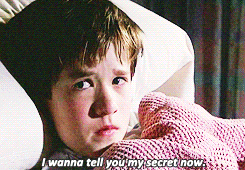
In 2016 (you read that date right), the security firm Imperva found that bots were responsible for more than 50% of web traffic for the first time. That was before LLMs like ChatGPT could produce thousands of fake web pages in minutes.
The Dead Internet Theory, once the lore of dark web conspiracy theorists, says that the Internet is dead as a highway of human engagement and thinking. It is now the automated purveyor of artificially manufactured clickbait for other bots.
This is chaos, right?
Right.
This is chaos (🪜).
Who benefits from selling robot-made clicks to companies to content made by the same robots who sold the clicks? The Dead Internet is a toll road for every business, scraping value off the top of your revenue as you scramble for bypass roads like this newsletter, walled gardens, and first-party data to get around the digital 405, which charges you by the minute just to sit in 18 lanes of unmoving traffic.
⚠️SERIOUSLY⚠️ trust the distrust
One of the hot items on our 2024 Sticker Drop ("Marketing is Hard; Deal with It" Edition) is our infamous advice: Trust the distrust.

No one has garnered more earned distrust in the last 18 months than Elon Musk. While vacuuming cash out of Tesla into his personal pockets, he decimated the supercharging division right after convincing the entire U.S. ecosystem to depend on it for charging across all EVs. It's sort of like Standard Oil burning the oil fields just as every American was buying their first car.
An opportunity now emerges for a Consortium of the Sane™️ to assemble and build a truly collaborative and manufacturer-agnostic protocol for EV charging across the U.S. Carbon-neutral, highspeed travel is essential to the next wave of social and economic development in this country. We were insane to trust it to Elon Musk.
Now choose wisely
Chaos is a ladder that only 1 to 2 leaders and companies in any industry can own. The swirl they create makes the progress of others near impossible. But ultimately, they are thwarted by wilier upstarts who use the chaos as a shield for a smarter, more focused play. All empires fall.
You could be that wilier player. In your industry, one or two companies are setting the terms of play. The digital ecosystem gives them near unlimited power to keep you from gaining traction. You could continue to scrap your knees trying to beat the House, or you could choose not to play. You could choose to get off the 405. Own the vulnerability of "this is me" and climb the back side of the chaos ladder. Sneaking up on the competition and changing the game yourself.
You could be that brave.


